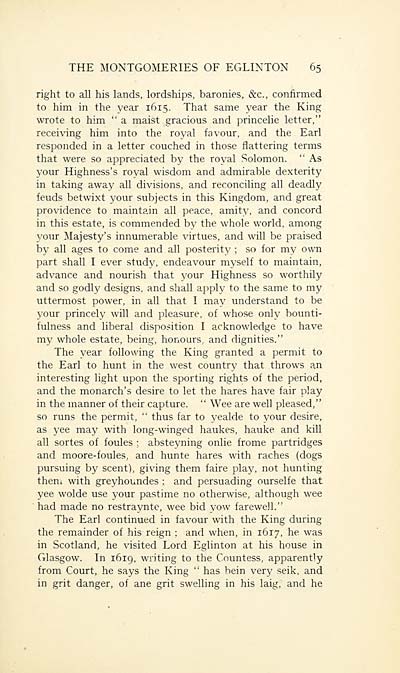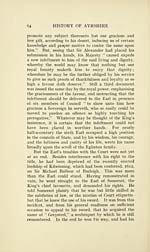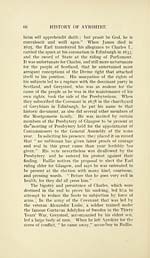Download files
Complete book:
Individual page:
Thumbnail gallery: Grid view | List view

THE MONTGOMERIES OF EGLINTON 65
right to all his lands, lordships, baronies, &c, confirmed
to him in the year 1615. That same year the King
wrote to him " a maist gracious and princelie letter,"
receiving him into the royal favour, and the Earl
responded in a letter couched in those flattering terms
that were so appreciated by the royal Solomon. " As
your Highness's royal wisdom and admirable dexterity
in taking away all divisions, and reconciling all deadly
feuds betwixt your subjects in this Kingdom, and great
providence to maintain all peace, amity, and concord
in this estate, is commended by the whole world, among
your Majesty's innumerable virtues, and will be praised
by all ages to come and all posterit}^ ; so for my own
part shall I ever study, endeavour myself to maintain,
advance and nourish that your Highness so worthily
and so godly designs, and shall apply to the same to my
uttermost power, in all that I may understand to be
your princely will and pleasure, of whose only bounti-
fulness and liberal disposition I acknowledge to have
my whole estate, being, honours, and dignities."
The year following the King granted a permit to
the Earl to hunt in the west country that throws an
interesting light upon the sporting rights of the period,
and the monarch's desire to let the hares have fair play
in the manner of their capture. " Wee are well pleased,"
so runs the permit, " thus far to yealde to your desire,
as yee may with long-winged haukes, hauke and kill
all sortes of foules ; absteyning onlie frome partridges
and moore-foules, and hunte hares with raches (dogs
pursuing by scent), giving them faire play, not hunting
them with greyhoundes ; and persuading ourselfe that
yee wolde use your pastime no otherwise, although wee
had made no restraynte, wee bid vow farewell."
The Earl continued in favour with the King during
the remainder of his reign ; and when, in 1617, he was
in Scotland, he visited Lord Eglinton at his house in
Glasgow. In 1619, writing to the Countess, apparently
from Court, he says the King " has bein very seik, and
in grit danger, of ane grit swelling in his laig, and he
right to all his lands, lordships, baronies, &c, confirmed
to him in the year 1615. That same year the King
wrote to him " a maist gracious and princelie letter,"
receiving him into the royal favour, and the Earl
responded in a letter couched in those flattering terms
that were so appreciated by the royal Solomon. " As
your Highness's royal wisdom and admirable dexterity
in taking away all divisions, and reconciling all deadly
feuds betwixt your subjects in this Kingdom, and great
providence to maintain all peace, amity, and concord
in this estate, is commended by the whole world, among
your Majesty's innumerable virtues, and will be praised
by all ages to come and all posterit}^ ; so for my own
part shall I ever study, endeavour myself to maintain,
advance and nourish that your Highness so worthily
and so godly designs, and shall apply to the same to my
uttermost power, in all that I may understand to be
your princely will and pleasure, of whose only bounti-
fulness and liberal disposition I acknowledge to have
my whole estate, being, honours, and dignities."
The year following the King granted a permit to
the Earl to hunt in the west country that throws an
interesting light upon the sporting rights of the period,
and the monarch's desire to let the hares have fair play
in the manner of their capture. " Wee are well pleased,"
so runs the permit, " thus far to yealde to your desire,
as yee may with long-winged haukes, hauke and kill
all sortes of foules ; absteyning onlie frome partridges
and moore-foules, and hunte hares with raches (dogs
pursuing by scent), giving them faire play, not hunting
them with greyhoundes ; and persuading ourselfe that
yee wolde use your pastime no otherwise, although wee
had made no restraynte, wee bid vow farewell."
The Earl continued in favour with the King during
the remainder of his reign ; and when, in 1617, he was
in Scotland, he visited Lord Eglinton at his house in
Glasgow. In 1619, writing to the Countess, apparently
from Court, he says the King " has bein very seik, and
in grit danger, of ane grit swelling in his laig, and he
Set display mode to:
![]() Universal Viewer |
Universal Viewer | ![]() Mirador |
Large image | Transcription
Mirador |
Large image | Transcription
Images and transcriptions on this page, including medium image downloads, may be used under the Creative Commons Attribution 4.0 International Licence unless otherwise stated. ![]()
| Histories of Scottish families > Ayrshire > Volume 2 > (75) Page 65 |
|---|
| Permanent URL | https://digital.nls.uk/95189998 |
|---|
| Attribution and copyright: |
|
|---|---|
| Description | A selection of almost 400 printed items relating to the history of Scottish families, mostly dating from the 19th and early 20th centuries. Includes memoirs, genealogies and clan histories, with a few produced by emigrant families. The earliest family history goes back to AD 916. |
|---|

